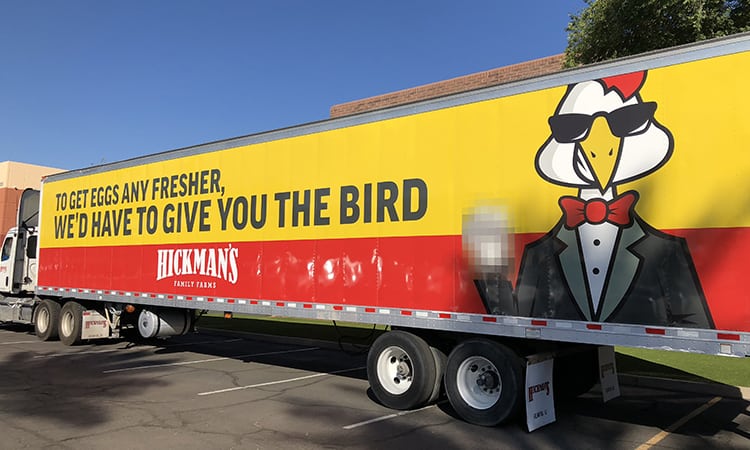Local mainstay, Hickman’s Family Farms is celebrating its 75th anniversary. With humble beginnings as a small homestead business, Hickman’s has expanded to become one of the Valley’s most prominent companies.
Nell Hickman and her husband, Guy, moved to Phoenix in 1944. Aiming to be resourceful, the young bride acquired a few backyard chickens. Nell grew up in Kansas where that was a common practice – an easy way to have fresh eggs for the family and for housewives to earn a little extra money. At that time, keeping chickens was not widespread in Glendale and Nell’s neighbors took notice. Locals loved the fresh eggs, so she continued to add to her flock so she could supply eggs to her neighbors. As a way to better manage the growing number of chickens, Guy built a coop, which was an early innovation. The hens thrived in the coop and their individual cages. By 1957, the small flock grew to 500.
In the spring of 1957, Nell’s daughter-in-law, Gertie, also a resourceful woman and entrepreneur purchased 500 baby chicks to match Nell’s flock and become a 50-50 partner in the business. Soon egg production exceeded back porch sales, so Gertie started selling eggs out of her husband Bill’s 1955 Ford coupe to local cafes and grocery stores.
By 1959, the wives were at capacity and Nell’s son, Bill—Gertie’s husband—left his job at the service station to join the women in business. Over the next 10 years, from 1959 to 1969, Hickman’s Egg Ranch grew to 80,000 laying hens on 10 acres on 67th and Missouri Avenues.
With a little foresight and luck, Bill and Gertie Hickman purchased 40 acres of land on 91st and Orangewood Avenues in 1968. The family built a home there in 1970, then began building seven hen houses to expand. Eventually, the hens were relocated from the 67th Avenue farm. By 1975, Hickman’s Family Farms had grown to 125,000 laying hens.
Today, Hickman’s Family Farms has locations in Arlington, Tonopah, Maricopa, Grand Junction, Colo., Hudson, Colo., and Wasco, Calf., and 13 million hens. Hickman’s Family Farms is now the second-largest egg producer west of the Rockies.
There are several keys to the company’s success and growth. Hickman’s has always prioritized efficiency, sustainability, cutting-edge technology and minimizing and utilizing waste. Early on, the company built a feed mill and processing plant, allowing them to keep these necessities in-house. Automation and computer monitoring systems were built into the barns in the early 2000s, improving the feeding, watering and climate control for the hens. The company has also taken steps to recycle waste streams. Broken eggs are collected and eggshells are harvested for the limestone and the eggs are turned into protein powder that is used in a variety of ways. Manure is also collected and turned into fertilizer that is used to treat golf courses and even organic lettuces.
Hickman’s is proud to claim that no human hand touches an egg until they reach a customer’s kitchen. Robots have been implemented to transport, pack and move the fragile eggs and cartons.
Additionally, the company has listened to consumers and adapted both feeding and housing practices for the hens. In 2016, the company expanded its cage-free barns. These barns afford the hens freedom to roam inside their climate controlled barn, under the supervision of Hickman’s staff, nutritionist, and on-staff veterinarian. In 2018, Hickman’s expanded into brand new grass-fed eggs, which produce an egg at least three times richer in Omega 3 fatty acids than average due to the hens’ diet high in grasses and flax.
Hickman’s most recent advancement has come in the form of a new egg carton that is composed of 100 percent post-consumer recycled PET plastic. Hickman’s Family Farms is the first egg-producing company to offer a completely recycled plastic carton. Three average-sized soda bottles are used to make a 12-count egg container, and five plastic bottles are used to make an 18-count container, saving millions of water and soda bottles from landfills each year and preserving other natural resources that go into making traditional foam or pulp cartons.
In 2017, the company dusted off its tail feathers and launched new taglines, cartons and graphics on its trucks. The new look and eye-catching slogans are another example of how Hickman’s Family Farms has continued to evolve and stay fresh.
No longer a backyard hobby, as Hickman’s enters its 75th year, the third and fourth generation of Hickmans are involved in operating and innovating to carry on the family’s legacy and contribute to the Valley’s important agriculture industry.
To learn more about Hickman’s Family Farms, visit hickmanseggs.com and follow on social media @hickmanseggs.




